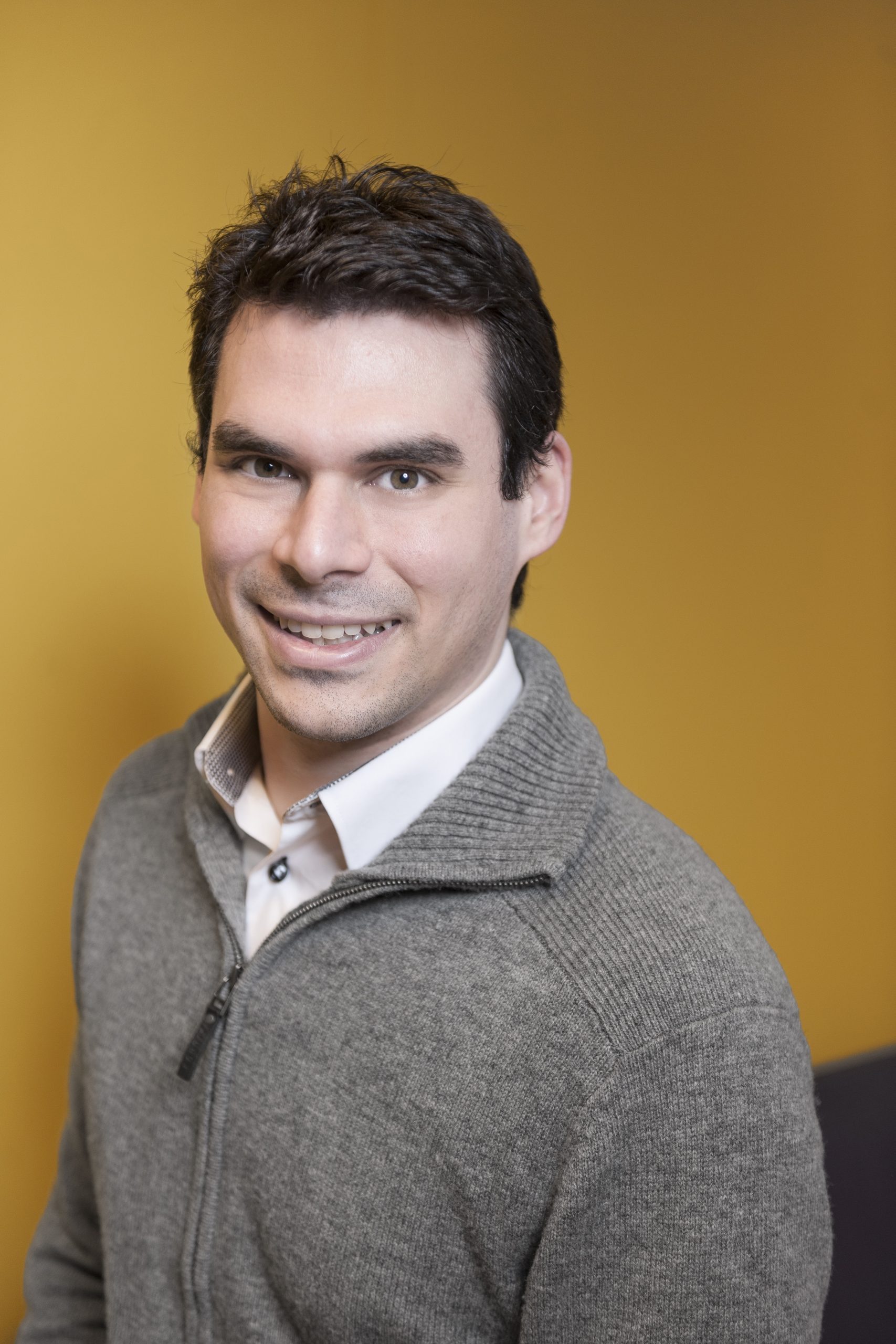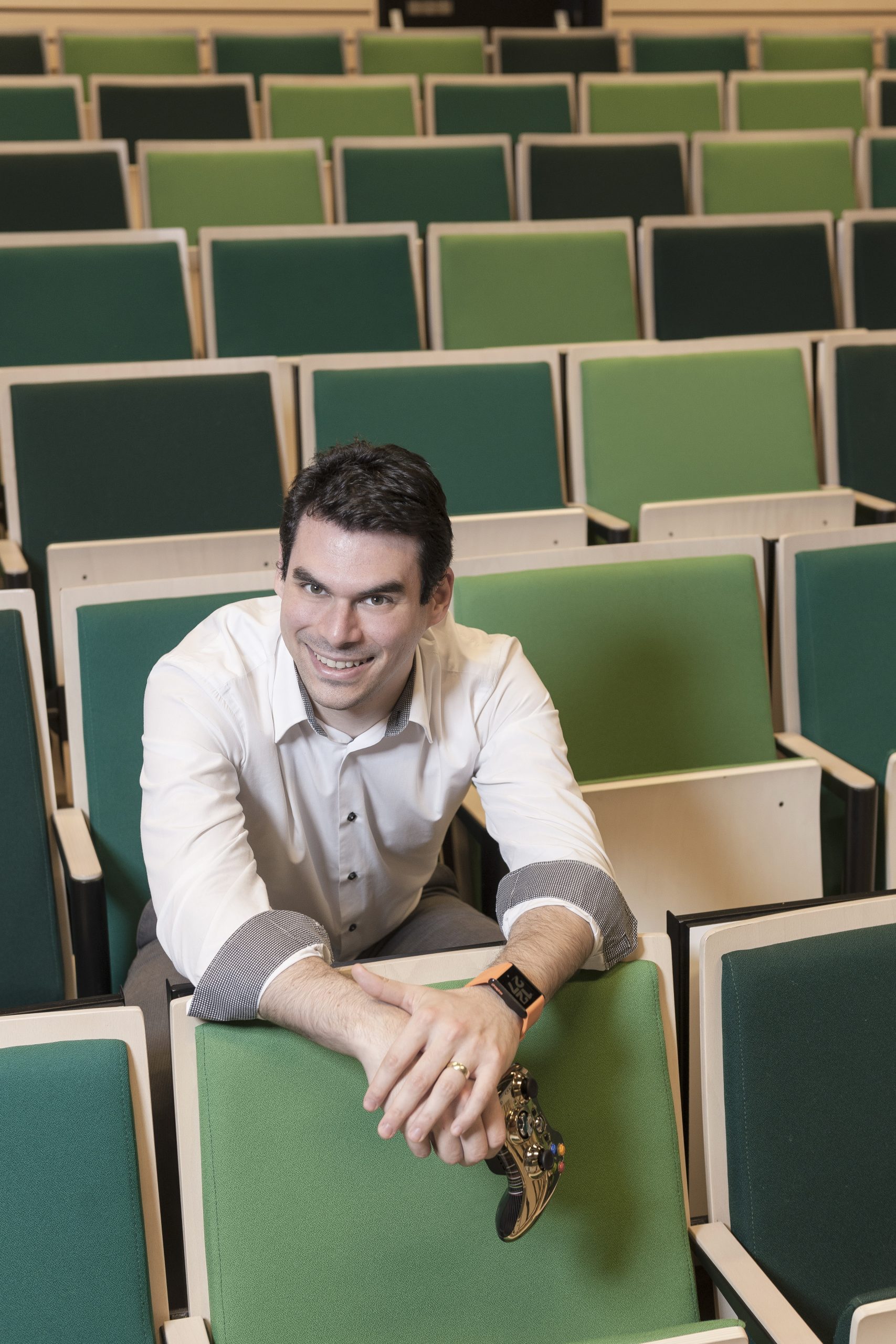No two students are alike, says Assistant Professor Alexandru Iosup (EWI). The 2014 Best Lecturer at TU Delft and Best Lecturer in the Netherlands employs a unique approach to teaching, using gamification to motivate his students.
You were recently voted the Best Lecturer at TU Delft. How does it feel to have won this award?
“It was extremely unexpected. I think there’s still quite a lot to do, so in my mind the job is not yet done. But of course, it was very nice to receive some recognition for it. I think an individual award is not exactly what should be there. I’m actually working with ten persons to deliver a course, so it’s a completely different situation. An individual award is nice, but it should have an appendix saying that the team is much larger.”
What does this award mean to you personally?
“It’s my first education award, so it’s nice to get something in an area in which, frankly, I’m still young in. It’s a big confidence boost and it’s always interesting to have this kind of recognition. For me personally, it was very rewarding.”
You have been praised for using game tactics in your courses. Could you tell us more about this?
“In general, gamification is the idea of using elements or techniques developed primarily for computer games to deliver higher education courses. It’s been done before, also in enterprise and industry. What I’m doing differently is that I consider social gaming as the source of these elements. It’s very important, especially for the social mission of TU Delft. We want to develop not only people who have the basic skills but also people who react socially in a proper way.
I’m particularly interested in the notion that students are different, one from the other. Some students are very raw when they enter university and others are much better developed. This doesn’t happen as much outside the Netherlands because universities filter students with an entrance exam, so part of the skill is assessed. But this skill level is also related to how students develop during the course. They start at a certain level, but they also grow quite a lot. You have to manage this very carefully, because you have early starters and really late developers in the classroom.
The other factor is that people have different motivations in life. They want to do different things. What I’m really interested in are students who like to explore. I think it’s a particular strength of the Netherlands and of countries in the Western Bloc. They have students who think, if I explore, at some point I will find something interesting, which will be rewarding for me, but will also be valuable for society or for the industry. So explorers are very important because without them, you stagnate at the level of knowledge at which you started with. If you only focus on the achievement of beating the set of exercises, you will never get through the discussion. This is a very important motivator and you have to build a classroom or a gamefied environment that stimulates all categories of players or in my case, students.”
Are these gaming methods effective?
“I think they are very effective. When I took on the computer systems course, it was one of those first year courses, which received the lowest kind of assessments. Students were really unhappy about the difficulty of the material. Also, the way it was taught was perhaps not the best. As soon as I started applying some of the gaming elements, immediately students started to respond. Students started to feel motivated to pick what they liked. At that moment, I saw much more involvement in the students and much better results. Every year, we tried to increase the difficulty of the course and even then, students were passing in higher fractions, so I think it really works.”
Dutch students seem to do only the bare minimum in order to pass. Is this indeed the case?
“I think this is a very real situation. Dutch students are motivated not by the grade but only by what they learn. Now, I actually find this interesting. I would say it is even a benefit of Dutch culture. It’s of course more difficult as a professor to get the students engaged and motivated. On the other hand, when they learn something, they learn it because they’re interested in it, so they are not diploma-chasers. They’re not grade-chasers. In other places – the US, Romania, Israel – you hear lots of complaints about students chasing the high grade and only the grade. They don’t necessarily learn more. If they are only interested in the points, the whole learning attitude disappears.”
TU Delft is striving to enhance its reputation for excellence. Does the so-called ‘zesjescultuur’ inhibit this?
“If it would be complete apathy, I think it would inhibit any attempt towards excellence. But that’s actually not the case. We get a number of students who definitely shouldn’t be here, but the penalty for failure is low enough that they get to try until they find something they like. I can tell you that the students who really like something end up doing very well. I find this really appealing. I don’t want to apologize too much for the students. I think they should also do a bit of soul-searching and figure why they are here if they only aim for the average. But as it turns out, most students really find what they like.”
Is the university doing enough to motivate its students to strive for excellence?
“I think the university can do much more to really explain what excellence means. That’s an aspect that’s missing. I’ve had long discussions with many Bachelors students in the Honours Track who could not understand the meaning of what I consider as excellence, which is basically at an international level, in competition with everyone else in the world. They were really bright, but relative to the entire world, they still had quite a bit to improve on. Somebody should have had this discussion earlier to explain to them what the absolute top level is.”
Prior to becoming an Assistant Professor, you completed your PhD in Computer Science at TU Delft. What made you decide to come to the Netherlands?
“I was a Master Student in Romania at the time and my future wife did a Masters internship at TU Delft. I came to visit her and I really loved the country. I think it was the relaxed attitude that won me over. People were on the streets, laughing. I’ve never seen anything like that in my life. I come from a really harsh environment and seeing this – people laughing on old bikes – for me is a completely different frame of mind. It felt so right. We felt this was a good place to develop. It’s a bit romantic.”
How has your experience been as an international member of the TU Delft Faculty?
“For the first five or six years, I was mostly working and travelling quite a lot. So the part of Dutch society that I saw was basically the one I was involved in: sports, which is a certain type of bubble and the university, which is another type of bubble. Things were okay and I was even considering applying for citizenship and learning the language very well.
But at some point, there was a certain Geert Wilders who got a number of seats [in the Dutch parliament] and then things started to change. For many years, I’ve refereed basketball games. I was going to these smaller towns and I started hearing a few things that I would have preferred not ever hearing. These things stopped my attempt to get Dutch citizenship for a long while.
Within TU Delft, I think the relationships are quite okay. I’ve actually worked in seven different countries and, relative to the places I’ve been to, I think the Netherlands is much more open. The opportunities you get here without any kind of connections or networks are reasonable. So from this perspective, I think it’s a good place to work.”
Did you have any difficulties integrating into Dutch society?
“Well, I have the advantages or the disadvantages of being a geek, so my integration would be difficult anywhere in the world. My family has some good Dutch friends and we speak the language to the level at which we can, which is rubbish compared to our English, unfortunately. I realized that if I would have been a much more social person, I would have really suffered. Then again, it doesn’t bother me much because I’m geekish and withdrawn. I guess many computer scientists are. But if you were doing something fun and social, maybe you would have felt more constrained.”
Internationalization has become a top priority for the university in recent years. Has the situation changed during your time at TU Delft?
“That I think has changed quite a lot. First, we are getting way more international students and professors. Then there’s an intense pressure to reassess a number of things that are part of this internationalization process. How do the different cultures actually match? Are Dutch citizens gaining or losing out of it? TU Delft is doing a good job involving more international people and I think, for Dutch society, this is really important. The Netherlands wasn’t very regional before, but it had a uniform character. Now, it has to reassess itself. Can the Netherlands really survive by being the small country it was fifty years ago? I’m not so sure that’s possible anymore. I think internationalization is a smart move, but it also comes with very important responsibilities because with these different cultures come different expectations and different problems.”
 CV
CVCV
Alexandru Iosup (1980) studied computer science at the Politehnica University of Bucharest in Romania and at the Ecole Superieure d’Electricite in France. In 2009, he completed his PhD in Computer Science at TU Delft before being appointed Assistant Professor with the Parallel and Distributed Systems Group. He received an NWO Veni grant for young researchers in 2011 and was awarded the ‘Best Lecturer at TU Delft’ in November 2014 and ‘Best Lecturer in The Netherlands’ in January 2015.



Comments are closed.